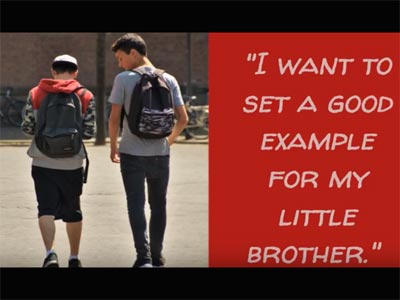Dreamers are not villains, they are children of God, said United Methodist Bishop Minerva Carcaño.
"I have been very concerned about the way Dreamers, young people, are being villainized and used in this whole appropriations process," said Carcaño, chair of the United Methodist Council of Bishop's Immigration Task Force and episcopal leader of the California-Nevada Conference.
Your support of the Episcopal Fund apportionment helps pay for bishops' salaries, office and travel expenses, and pension and health-benefit coverage.
Dreamers or DACA (Deferred Action for Childhood Arrivals) recipients are young people brought to the United States by their parents as children. Under President Barack Obama, DACA allowed some minors a renewable two-year period of deferred action from deportation and made them eligible for a work permit. Since 2012, the status has been issued to 800,000 young people.
 |
| Video image from "The JFON DREAMers," courtesy of Justice for Our Neighbors |
President Donald Trump ended the program last September.
"Nearly 75 percent of Americans agree favor granting permanent legal status to Dreamers, so this solution should not be conflated with other, more controversial policies such as a border wall (which 40 percent of Americans support)," he said.
Jeania Ree Moore, director for civil and human rights, United Methodist Board of Church and Society, said Congress passed a continuing resolution funding the government through February 8. She added that the majority leaders in Congress agreed to address the plight of Dreamers in the next two to three weeks.
"This means that the most important thing we can do right now is call our members of Congress and demand the passage of the Dream Act," said Moore, who added that
The United Methodist Church has called for the passage of the Dream Act since 2012 in the Book of Resolutions — Number 3164 The DREAM Act.
Since DACA first began on Aug. 15, 2012, the JFON network has helped thousands of young undocumented immigrants become "DACAmented," enabling them to pursue their dreams in the only country they've known.
"Simply doing this without changing our nation's immigration laws will encourage low-skilled parents from around the world to illegally immigrate to this country with their small children in hopes of obtaining citizenship. And once they and their children receive citizenship, other extended family members will follow, continuing a never-ending cycle of falling wages and mass migration."
Carcaño counters that "chain migration" is a negative term for family reunification.
The New York Times reported Jan. 25 that Trump had proposed legislation to provide a path to citizenship for as many as 1.8 million young undocumented immigrants. The proposal includes an end to family-based migration policies, a border wall and a crackdown on other immigrants living in the country illegally.
Those proposals are not consistent with The United Methodist Church's Social Principles and some churches are taking direct action to help immigrants avoid deportation.
"We continue to call the church to prayer. Prayer is a means of grace," Carcaño said. "We need the fullness of God's grace that we might be a moral voice in these troubled times. Prayers that immigrants may be comforted, hearts may be touched, that we might do what Jesus would do."
Kathy Gilbert, multimedia reporter for UMNS
One of seven apportioned giving opportunities of The United Methodist Church, the Episcopal Fund pays for bishops' salaries, office and travel expenses, and pension and health-benefit coverage. Please encourage your leaders and congregations to support the Episcopal Fund apportionment at 100 percent.





